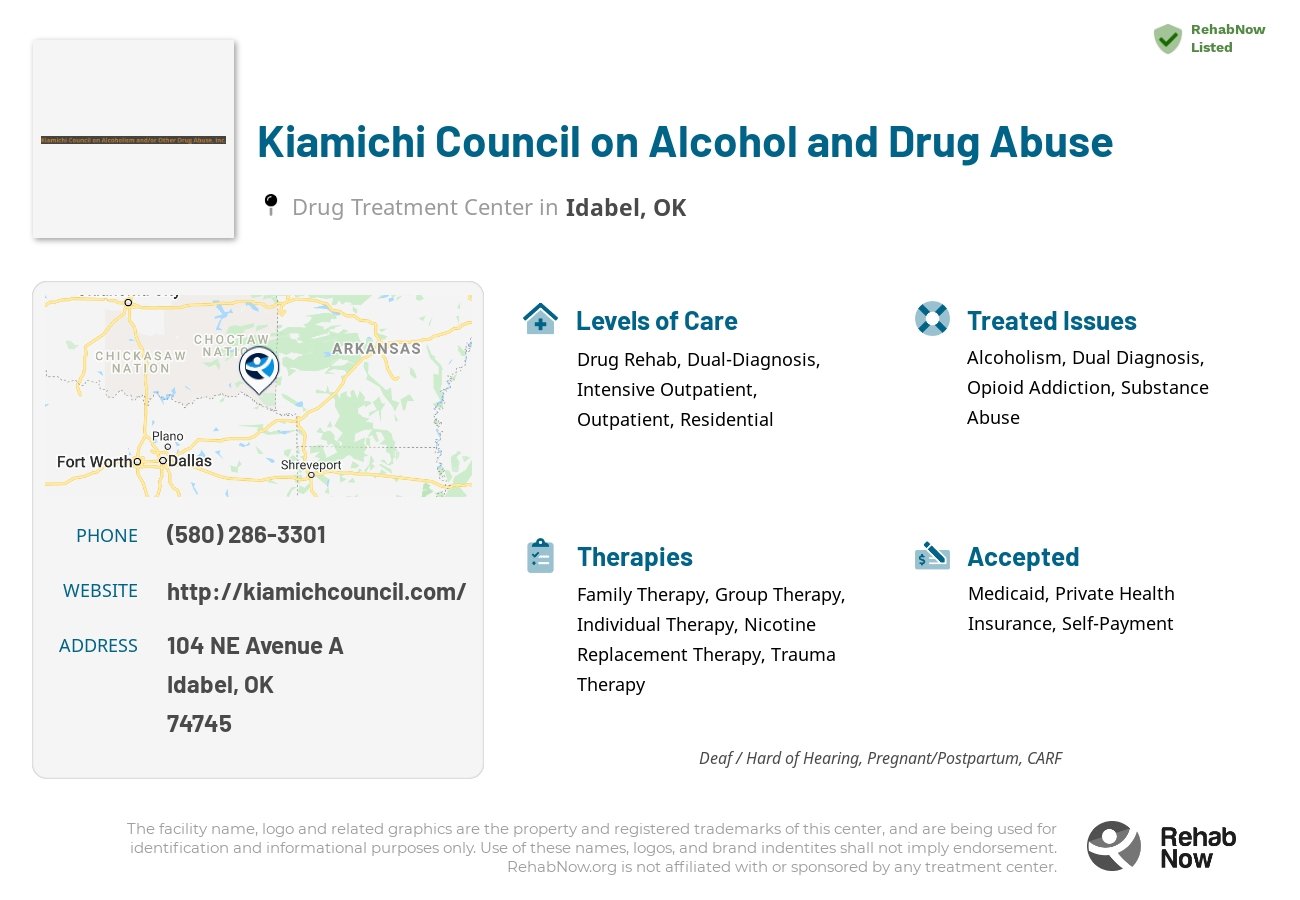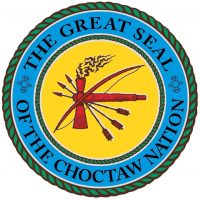Kiamichi Council on Alcohol and Drug Abuse
Drug Rehab Center in Idabel, Oklahoma
The Kiamichi Council on Alcohol and Drug Abuse is a non-profit mental health and addiction services provider in Idabel, Oklahoma, offering personalized treatment, including outpatient and residential programs, evidence-based therapy, medical and psychiatric assessments, family counseling, and youth-focused programs.
About This Oklahoma Facility
Kiamichi Council on Alcohol and Drug Abuse is a mental health and addiction services provider located in Idabel, Oklahoma. It is a non-profit organization focused on providing individualized and comprehensive treatment to those with substance use disorders and behavioral health problems. The facility strives to provide an environment that is safe, caring and supportive, while also offering a range of treatment services designed to meet the individual needs of their clients. The center offers outpatient and residential treatment programs, as well as prevention, early intervention and aftercare services.
Kiamichi Council on Alcohol and Drug Abuse provides evidence-based treatment modalities such as cognitive-behavioral therapy (CBT), dialectical behavior therapy (DBT), Twelve Step programming, mindfulness-based stress reduction, and trauma-informed care. In addition, the center offers a wide range of services to address both physical and mental health needs, such as medical assessments and case management, nutritional counseling, HIV/AIDS testing and education, and psychiatric evaluations and medication management. The center also provides family counseling, motivational interviewing and youth focused programs to equip those affected by addiction with the skills necessary for lifelong recovery.
Kiamichi Council on Alcohol and Drug Abuse is fully accredited by the Commission on Accreditation of Rehabilitation Facilities (CARF) and accredited by the National Association of Addiction Treatment Providers (NAATP). The facility is also licensed by the Oklahoma Department of Mental Health and Substance Abuse Services. Aside from its comprehensive range of services, Kiamichi Council on Alcohol and Drug Abuse also provides a safe, structured, and supportive environment to ensure the success of each individual’s recovery journey.
Genders
Ages
Modality
Additional
Accreditations

CARF
The Commission on Accreditation of Rehabilitation Facilities (CARF) is a non-profit organization that specifically accredits rehab organizations. Founded in 1966, CARF's, mission is to help service providers like rehab facilities maintain high standards of care.
Conditions and Issues Treated
People who abuse drugs are likely to suffer from an addiction, which can cause serious health problems. When it comes to helping drug abusers get sober, there are many options to choose from. It is essential to state that there is no “”correct”” way of doing things. People are different, and they need different types of help to get over their addiction.
Many people who struggle with opioid addiction need to attend specific programs like methadone , Suboxone or Vivitrol clinics.
These types of programs will provide the patient with legal, prescription medications that can help them overcome their cravings for illegal opioids like heroin or fentanyl . If the patient has a chronic condition like Hepatitis C, they must undergo treatment before they can begin taking these medications.
Dual Diagnosis refers to someone who is both dealing with addiction and another mental health issue.
There are different kinds of Dual Diagnosis: A person who simultaneously experiences both a mental illness and an addiction disorder. Or, a person who experiences one or more coexisting (simultaneous) mental health conditions in addition to a primary substance use disorder.
Some conditions that commonly co-occur with addiction include:
- Personality Disorders (Borderline, Narcissistic)
- Mood Disorders (Bipolar Disorder, Depression, Anxiety Disorder)
- PTSD (Post Traumatic Stress Disorder), OCD (Obsessive Compulsive Disorder), ADHD (Attention Deficit Hyperactivity Disorder)
- Schizophrenia, Psychosis, Hallucinations, Delusions
Levels of Care Offered at Kiamichi Council on Alcohol and Drug Abuse
This center offers a variety of custom treatment tailored to individual recovery. Currently available are Drug Rehab, Dual-Diagnosis, Intensive Outpatient, Outpatient, Residential, with additional therapies available as listed below.
Outpatient addiction treatment is beneficial for people who are able to function well in their day-to-day lives. It is recommended for people who are not yet ready to end their relationships with friends or family members who might be encouraging drug and alcohol use.
Intensive outpatient treatment is beneficial for:
- People who are able to attend treatment more than 3 times per week.
- People who do not meet the criteria for inpatient treatment.
- People who are able to contribute to their own recovery outside of the treatment center.
- People who are motivated towards recovery.
- People who are able to overcome addiction on their own without the need for higher levels of care.
Outpatient treatment programs provide drug and alcohol addiction treatment through individual sessions with a counselor, group therapy, 12-step meetings, and other activities to help individuals gain sober living skills. Most programs are designed for those individuals who have completed a medically supervised detoxification program and provide opportunities for clients to begin the process of early recovery.
Outpatient programs also offer a level of medical support as needed and psychological backing through therapy. Clients are encouraged to live at home, though there may be some flexibility regarding this requirement based on the circumstances and needs of each patient.
Outpatient treatment is perhaps the most common type of dual diagnosis program available. It does not pose a significant financial burden on patients. However, it is essential to note that outpatient treatment does not provide the support and supervision given in residential programs. Some addicts may need this level of support to maintain their sobriety.
Residential treatment programs are those that offer housing and meals in addition to substance abuse treatment. Rehab facilities that offer residential treatment allow patients to focus solely on recovery, in an environment totally separate from their lives. Some rehab centers specialize in short-term residential treatment (a few days to a week or two), while others solely provide treatment on a long-term basis (several weeks to months). Some offer both, and tailor treatment to the patient’s individual requirements.
Therapies & Programs
Therapy sessions focused on the individual addict can provide much-needed guidance as they work toward overcoming their addiction. These types of sessions typically involve guidance from a therapist, who will help addicts identify and process their feelings and cravings.
During these sessions, addicts may develop plans for coping with the triggers that typically lead to relapse and learn how to avoid those triggers during their recovery process.
The main goal of family therapy for drug addiction is to create an environment where communication can occur without judgment, hostility, or blame that often occurs within a family.
Family therapy is a type of group problem-solving that aims to improve communication and relationships between the patient, their family, and sometimes friends. The therapist is with the family as they learn to communicate with each other differently, especially with the addict when s/he is using.
The family can learn to reduce their enabling behavior or rally together and support each other during tough times. The patient also learns how to deal with their addiction and maintain sobriety while interacting with the family.
Different types of addiction treatment services are available. Within this article, group therapy is of interest due to its high success rate compared to individual therapy. Group therapy settings are beneficial because they allow recovering addicts to build a strong support network.
Benefits of group therapy are:
- Reduces feelings of isolation
- Immediate access to social support in the form of fellow addicts in recovery
- Lowers risk of relapse
- Increases rate of sobriety
- Builds coping skills that can be applied to everyday life
Trauma Therapy is a form of therapy that involves working with a patient to help them process and understand the past trauma(s) in their life. The idea behind it is that while some people can experience traumatic events and not have lasting psychiatric symptoms, many others will. In these cases, memories of the event get hidden from consciousness but continue to influence how the person processes and copes with things in their life. They may avoid situations that resemble what happened or become suddenly angry or irritated to a situation that reminds them of a past event.
With the help of a therapist, people can go back over memories and experiences. This helps them understand why they are having problems coping with certain situations and how they can change how they think and react to things. This therapy is typically done using techniques such as visualization, discussion, and writing down thoughts and feelings.
Trauma therapists will work with clients to help them understand their past and present relationships. Many times, patients may believe that something is inherently wrong with them or that they are unworthy of love. A therapist aims to correct these negative feelings and behaviors by helping the person realize that their actions do not reflect who they truly are.
One of the main goals of trauma therapy is to help clients express their emotions and talk about what they are feeling. This benefits both to increase awareness of how certain events have impacted them in the past and enables patients to realize that they can make changes in their lives.
Payment Options Accepted
For specific insurance or payment methods please contact us.
Is your insurance accepted?
Ask an expert, call (888) 674-0062
Additional Details
Specifics, location, and helpful extra information.
Idabel, Oklahoma 74745 Phone Number(580) 286-3301 Meta DetailsUpdated November 25, 2023
Staff Verified
Patient Reviews
There are no reviews yet. Be the first one to write one.
Idabel, Oklahoma Addiction Information
The state of Oklahoma ranks second in the United States of America for residents with substance abuse disorders. Since 2004 the state has continuously exceeded the national standard of substance abuse cases. The state spent more than $37 million to combat addiction by investing in quality drug and alcohol addiction treatment in 2017. An estimated 600 to 800 people are on waiting lists each day for inpatient addiction treatment.
The drug addiction problem in Idabel, Oklahoma is serious. In 2012, there were 568 drug-related deaths in the area, and many of those deaths were linked to prescription drugs. In addition, 8.5 percent of residents reported using illicit drugs in the past month. Drug rehabilitation programs in Idabel, OK can vary in terms of their approach, but most centers will offer a range of services that aim to help addicts get sober.
Treatment in Nearby Cities
- Yukon, OK (200.7 mi.)
- Weatherford, OK (247.7 mi.)
- Enid, OK (244.2 mi.)
- Henryetta, OK (125.4 mi.)
- Pauls Valley, OK (148.7 mi.)
Centers near Kiamichi Council on Alcohol and Drug Abuse
The facility name, logo and brand are the property and registered trademarks of Kiamichi Council on Alcohol and Drug Abuse, and are being used for identification and informational purposes only. Use of these names, logos and brands shall not imply endorsement. RehabNow.org is not affiliated with or sponsored by Kiamichi Council on Alcohol and Drug Abuse.





